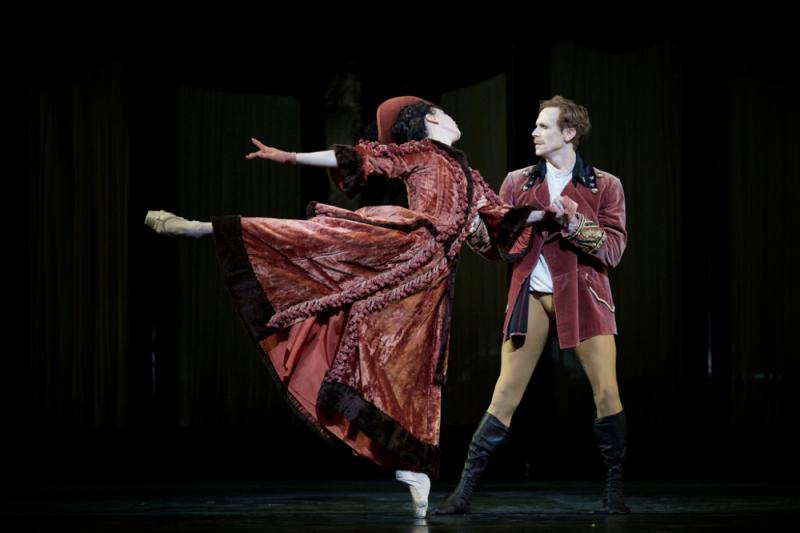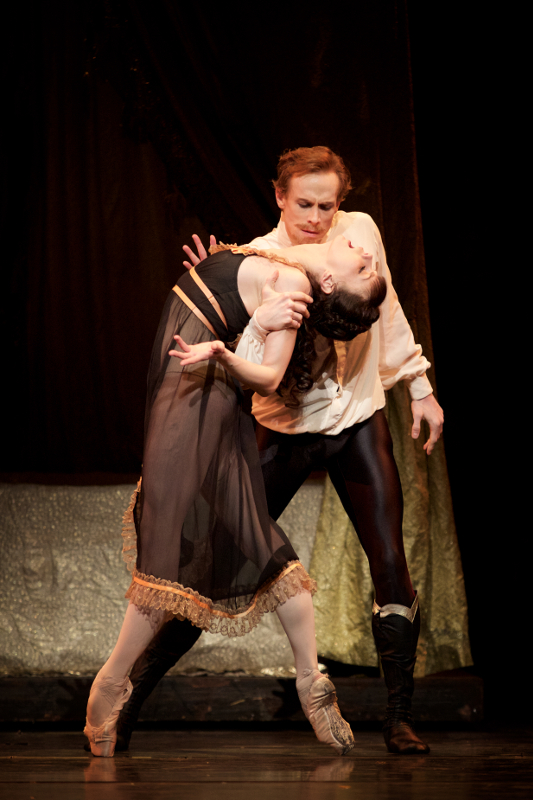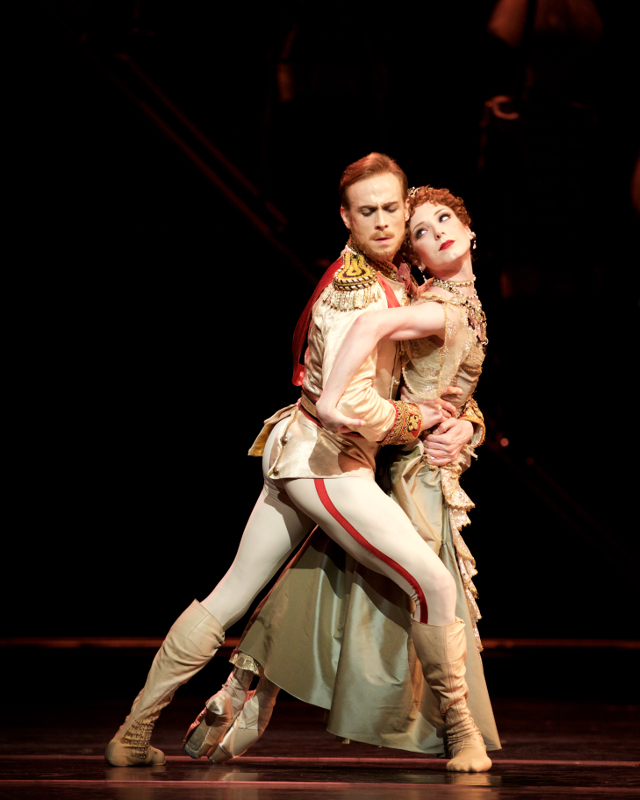Mayerling, Royal Ballet review - 'every ballet fan should see this' | reviews, news & interviews
Mayerling, Royal Ballet review - 'every ballet fan should see this'
Mayerling, Royal Ballet review - 'every ballet fan should see this'
Watson and Osipova hypnotic in MacMillan's character-driven masterpiece

Sure, there are things not to like about Kenneth MacMillan's Mayerling. Confusing plot. Plethora of characters. Unsympathetic (anti-)hero. Borderline melodramatic choreography. Tense, scary dénouement. But to be at the Royal Opera House last night was to be convinced that Mayerling's merits far outweigh its demerits.
 Crown Prince Rudolf, the mentally unstable Austrian heir whose deteriorating behaviour and eventual, scandalous, suicide with his teenage mistress are the ballet's focus, is ballet's Hamlet, the star role only a few dazzling dance-actors will be granted, or deserve. Edward Watson has replaced Carlos Acosta as the Royal Ballet's Rudolf par excellence, and what a tour de force he presents us with. Watson leans into MacMillan's twisting steps for Rudolf with the full force of his trademark suppleness: Rudolf's body, like his mind, is travelling in tortured circles, out of which he tries - but fails - to break (any step which looks like it might lead to a more open position of body or head ends up turning in, closing down, or doubling back on itself). Watson rises to the physical demands of the role with astonishing power, capturing fully the hypnotic quality of the mad prince's dangerous downward spiral.
Crown Prince Rudolf, the mentally unstable Austrian heir whose deteriorating behaviour and eventual, scandalous, suicide with his teenage mistress are the ballet's focus, is ballet's Hamlet, the star role only a few dazzling dance-actors will be granted, or deserve. Edward Watson has replaced Carlos Acosta as the Royal Ballet's Rudolf par excellence, and what a tour de force he presents us with. Watson leans into MacMillan's twisting steps for Rudolf with the full force of his trademark suppleness: Rudolf's body, like his mind, is travelling in tortured circles, out of which he tries - but fails - to break (any step which looks like it might lead to a more open position of body or head ends up turning in, closing down, or doubling back on itself). Watson rises to the physical demands of the role with astonishing power, capturing fully the hypnotic quality of the mad prince's dangerous downward spiral.
So fascinating is he that one understands why so many women circle Rudolf: he must duet with his mother, his wife, and some three or four former, current, or potential mistresses. In an embarrassment of casting riches, last night all were played by Royal Ballet principals (counting the character artists there were in total 10 principals on stage). The headline female role is Mary Vetsera, the young girl whose madness almost matches Rudolf's and who goes to her death with/because of him. Natalia Osipova's almost nonchalant virtuosity makes her an excellent partner for Watson in this ballet, and in the final two scenes of increasing threat, the two of them (pictured above right) were utterly compelling. So wrapped up in each other that even Alexander Campbell's crisp, ebullient clowning could not break the fug of their obsession, they twined round each other like crazed cats, high (or low) on drugs and despair. But Vetsera has a lot of competition in Rudolf's life, and Osipova had competition too: earlier, the stage had been dominated in turn by all the other ballerinas in a cast with not a single weak link. Francesca Hayward played poor Princess Stephanie, Rudolf's young and unloved wife, with a really nice hint of grit and backbone. With its threatening bedroom pas de deux, the part is an audition piece for playing Vetsera, a role Hayward is known to covet and in which, on this evidence, I would cast her in a heartbeat. Sarah Lamb (pictured left with Watson) makes commendably charismatic work of perhaps the trickiest role, Countess Larisch, who has more dance time with Rudolf than almost anyone else, but is a conflicted character, playing all sorts of risky games with him and others. Marianela Nuñez gets to play the courtesan Mitzi Caspar, probably the only woman in the ballet who ends up not too unhappy, a perfect role for Nuñez's sunny constitution and effervescently correct dancing. Empress Elisabeth, Rudolf's mother, was inhabited by the scene-stealingly wonderful Zenaida Yanowsky: in her pas de deux with Watson, the ballet's Hamlet-Gertrude scene, she goes through an almost unbearable range of (bad) emotional responses to her troubled son, from stiff formality to fervid affection to tortured tears. If we needed reminding to be sad about the imminent retirement from the company of this splendidly refined, intelligent dancer, here was ample reason.
But Vetsera has a lot of competition in Rudolf's life, and Osipova had competition too: earlier, the stage had been dominated in turn by all the other ballerinas in a cast with not a single weak link. Francesca Hayward played poor Princess Stephanie, Rudolf's young and unloved wife, with a really nice hint of grit and backbone. With its threatening bedroom pas de deux, the part is an audition piece for playing Vetsera, a role Hayward is known to covet and in which, on this evidence, I would cast her in a heartbeat. Sarah Lamb (pictured left with Watson) makes commendably charismatic work of perhaps the trickiest role, Countess Larisch, who has more dance time with Rudolf than almost anyone else, but is a conflicted character, playing all sorts of risky games with him and others. Marianela Nuñez gets to play the courtesan Mitzi Caspar, probably the only woman in the ballet who ends up not too unhappy, a perfect role for Nuñez's sunny constitution and effervescently correct dancing. Empress Elisabeth, Rudolf's mother, was inhabited by the scene-stealingly wonderful Zenaida Yanowsky: in her pas de deux with Watson, the ballet's Hamlet-Gertrude scene, she goes through an almost unbearable range of (bad) emotional responses to her troubled son, from stiff formality to fervid affection to tortured tears. If we needed reminding to be sad about the imminent retirement from the company of this splendidly refined, intelligent dancer, here was ample reason.
It was one of those magical evenings at the theatre where the chemistry clicked for everyone, not just among the dancers, but between dancers and orchestra, and between all performers and the audience. Martin Yates's conducting was empathetic, sensitive and heartfelt throughout, fully articulating the psychological insights of Liszt as captured by John Lanchbery's skilfully orchestrated composite score. The orchestra too seemed to be fired by inspiration: from the first moments of the overture, an uneasy dialogue of woodwind and strings, we were plunged into Mayerling's simmering world of tensions and divisions, all lucidly coloured by the various sections (with some lovely flute-playing in particular).
MacMillan's experiments in character-driven ballet did not convince everybody when he was alive; many ballet fans still do not see the point. There are some ballets of his that I too would rather not watch. But a performance of Mayerling like last night's proves beyond all doubt that MacMillan was a genius, and that his unique vision for what narrative ballet could do was not just pipe-dreaming, but - with the Royal Ballet dancers - a realisable vision. Mayerling may be difficult, but in the hands of the Royal Ballet and with Watson in the title role, it is absolutely essential.
- The Royal Ballet perform Mayerling at the Royal Opera House until 13 May.
- Read more dance reviews on theartsdesk
rating
Share this article
Add comment
The future of Arts Journalism
You can stop theartsdesk.com closing!
We urgently need financing to survive. Our fundraising drive has thus far raised £33,000 but we need to reach £100,000 or we will be forced to close. Please contribute here: https://gofund.me/c3f6033d
And if you can forward this information to anyone who might assist, we’d be grateful.

Subscribe to theartsdesk.com
Thank you for continuing to read our work on theartsdesk.com. For unlimited access to every article in its entirety, including our archive of more than 15,000 pieces, we're asking for £5 per month or £40 per year. We feel it's a very good deal, and hope you do too.
To take a subscription now simply click here.
And if you're looking for that extra gift for a friend or family member, why not treat them to a theartsdesk.com gift subscription?
more Dance
 Help to give theartsdesk a future!
Support our GoFundMe appeal
Help to give theartsdesk a future!
Support our GoFundMe appeal
 First Person: singer-songwriter Sam Amidon on working in Dingle with Teaċ Daṁsa on 'Nobodaddy'
Michael Keegan-Dolan’s mind-boggling total work of art arrives at Sadlers Wells this week
First Person: singer-songwriter Sam Amidon on working in Dingle with Teaċ Daṁsa on 'Nobodaddy'
Michael Keegan-Dolan’s mind-boggling total work of art arrives at Sadlers Wells this week
 Akram Khan, GIGENIS, Sadler’s Wells review - now 50, Khan returns to his roots
The dancer-choreographer goes epic in a show that unites South Asian dance styles
Akram Khan, GIGENIS, Sadler’s Wells review - now 50, Khan returns to his roots
The dancer-choreographer goes epic in a show that unites South Asian dance styles
 Maddaddam, Royal Ballet review - superb dancing in a confusing frame
Wayne McGregor's version of Margaret Atwood's dystopia needs a clearer map
Maddaddam, Royal Ballet review - superb dancing in a confusing frame
Wayne McGregor's version of Margaret Atwood's dystopia needs a clearer map
 Pina Bausch’s The Rite of Spring/common ground[s], Sadler’s Wells review - raw and devastating
Returning dancers from 13 African countries deliver celebrated vision with blistering force
Pina Bausch’s The Rite of Spring/common ground[s], Sadler’s Wells review - raw and devastating
Returning dancers from 13 African countries deliver celebrated vision with blistering force
 Legacy, Linbury Theatre review - an exceptional display of black dance prowess
An all-too-fleeting celebration of black and brown ballet talent that demands a reprise
Legacy, Linbury Theatre review - an exceptional display of black dance prowess
An all-too-fleeting celebration of black and brown ballet talent that demands a reprise
 National Ballet of Canada, Sadler's Wells review - see this, and know what dance can do
Yet again, Crystal Pite proves herself a ferocious creative force, alongside fellow Canadian exports James Kudelka and Emma Portner
National Ballet of Canada, Sadler's Wells review - see this, and know what dance can do
Yet again, Crystal Pite proves herself a ferocious creative force, alongside fellow Canadian exports James Kudelka and Emma Portner
 Nobodaddy, Teaċ Daṁsa, Dublin Theatre Festival review - supernatural song and dance odyssey
Michael Keegan-Dolan’s genius guides us through death, separation and loss
Nobodaddy, Teaċ Daṁsa, Dublin Theatre Festival review - supernatural song and dance odyssey
Michael Keegan-Dolan’s genius guides us through death, separation and loss
 Alice's Adventures in Wonderland, Royal Ballet review - big, bold and ultimately brash
It may be box-office gold, but Christopher Wheeldon's adaptation fails to find a beating heart down the rabbit hole
Alice's Adventures in Wonderland, Royal Ballet review - big, bold and ultimately brash
It may be box-office gold, but Christopher Wheeldon's adaptation fails to find a beating heart down the rabbit hole
 Resurgence, London City Ballet, Sadler’s Wells review - the phoenix rises yet again
A new 14-strong company reviving a much-loved name is taking ballet to smaller theatres
Resurgence, London City Ballet, Sadler’s Wells review - the phoenix rises yet again
A new 14-strong company reviving a much-loved name is taking ballet to smaller theatres
 The Mad Hatter's Tea Party, ZooNation, Linbury Theatre review - a joyous celebration of differentness
Kate Prince's hip hop take on Lewis Carroll is energetic, charming and moving by turns
The Mad Hatter's Tea Party, ZooNation, Linbury Theatre review - a joyous celebration of differentness
Kate Prince's hip hop take on Lewis Carroll is energetic, charming and moving by turns

Comments
I was there too, and after
I love Carlos Acosta and he
Ethel has beaten me to it. I